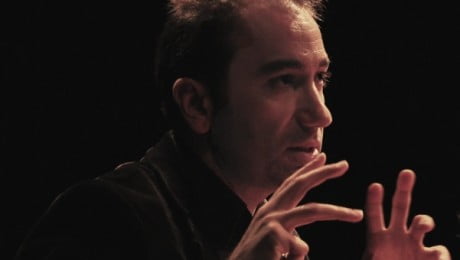Keyword: Fethullah Gulen

Turkey’s post-revolutionary civil war
What does this corruption investigation has anything to do with the AKP-Gülen Movement tension? Well, the prosecutor who apparently led this investigation in big secrecy, Zekeriya Öz, is believed to be a member of the movement. Corruption is a serious matter and the real best defense would be to help bring those who are charged to justice. Meanwhile, the Gülen Movement, normally a civil society group, should help save itself from the image of secrecy and infiltration that it has been drawn into in the past decade.

Turkish PM Erdoğan’s imagined enemies
Turkey is no longer the old Turkey. The affluent middle class, the young population and stronger civil society organizations, strengthened by the digital revolution with such tools as social media and Internet portals, will resist any attempts to turn the clock backwards on the development of Turkish democracy. People will simply ask why Prime Minister Erdoğan is not going after his people who have been sleeping with the enemy next door if he is really sincere in addressing external threats to this great nation.

Growing Corruption Inquiry Hits Close to Turkish Leader
In building his political career, Turkey’s powerful and charismatic prime minister, Recep Tayyip Erdogan, relied heavily on the support of a Sufi mystic preacher [Fethullah Gulen] whose base of operations is now in Pennsylvania. Mr. Gulen’s followers “never approved the role the government tried to attain in the Middle East, or approved of its policy in Syria, which made everything worse, or its attitude in the Mavi Marmara crisis with Israel,” said Ali Bulac, a conservative intellectual and writer who supports Mr. Gulen.

Don’t draw us into your family fight: Washington
The United States has told Ankara it has no any intention of getting involved into what it calls “a family fight,” denying conspiracy theories suggesting Washington’s role in the ongoing struggle between the government and the powerful Gülen community that has exploded with a new corruption probe. “Please don’t draw us into your family fight here. We don’t want one side or the other to feed this conspiracy idea that we are against the prime minister or against Fethullah Gülen Hocaefendi,”

German view of Hizmet Movement (2)
Seufert writes the Hizmet movement has arrived in Germany 30 years late, homed in on schooling and education rather than mosques; and that, currently, the number of schools and education centers has reached 24 and 300 respectively. “Gulen Movement is not a threat in Europe. If it was to pose any form of threat, it would be to its members who submit to authoritarian bodies. Yet, there has been no example of anyone forced to stay within the body against his/her will.”

AKP: What is next?
Neither Erdoğan nor his bureaucrats could convince the public that their plan was educational, and not an attempt to punish the Hizmet movement. Gül, Arınç and several of Erdoğan’s ministers couldn’t stop Erdoğan, who started a war against the Hizmet movement and even directly attacked Fethullah Gülen by taking remarks Gülen made about the headscarf ban 15 years ago completely out of context.

Hakan Şükür’s resignation: Rebellion of a conscience
Take a look at his wedding photo: on one side of a table is Islamic scholar Fethullah Gülen and on the other is Prime Minister Recep Tayyip Erdoğan. That photo reflects the feelings of millions. Şükür’s resignation is a sign that to him, that photo was torn up. If the government continues to keep up its hostile attitude against the Hizmet movement led by Gülen, millions will experience the same feeling. The real risk is here.

German view of Hizmet Movement (1)
I remember the late, right-minded orientalist Annemarie Schimmel’s words saying, “The most attacked and least understood religion in the West is Islam.” Today, we come across a similar statement in a recently published scholarly report too. I’m referring to the report titled, “Überdehnt sich die Bewegung von Fethullah Gülen?” by Stiftung für Wissenschaftund Politik (SWP), which put the Hizmet Movement under a scholarly microscope.

AK Party criticizes Hakan Şükür’s sudden resignation
Turkish media claimed that Prime Minister Recep Tayyip Erdoğan, the leader of the AK Party, said, “He [Şükür] resigned on an order [from the Hizmet movement], this is not a decision he can make alone.” However, AK Party spokesman Hüseyin Çelik denied the prime minister had made those comments. “I have spoken to the prime minister, everybody should know that he has not made such a statement,” Çelik said.

Profiled lawyer files criminal complaint against MİT, MGK
Taraf began publishing a string of confidential documents suggesting that the Justice and Development Party (AK Party) government and MİT had collected information on a large number of individuals through 2013 at the request of the MGK. The targets were reportedly members of the Hizmet movement, a faith-based community inspired by Turkish Islamic scholar Fethullah Gülen.

The state, AKP, Religious Affairs Directorate, Alevis and rights
The ruling Justice and Development Party (AKP) claimed it would minimize the space the state occupies in people’s lives and reduce bureaucracy and downsize the public sector when it was first elected to office. During the early years of its rule, it really moved to achieve these targets. But as it increased its control over the entire state apparatus, it has increasingly become yet another typical Turkish ruling party that prioritizes the state.

Gulen wants Anatolian [interpretation of] Islam
What does Gulen say? He says: “Work hard and earn money, but be honest. Allah will reward your hard work and honesty. But do not squander that reward. Turn it into an investment and help others.” It sounds a lot like the Protestant work ethic. This is the underlying vision of capitalism. The Gulen Movement looks a lot like the Ottoman-era Ahi movement. It is a kind of a solidarity group that provides people with jobs, education, and reintegration into society.

Pulitzer Prize equals five years in prison in Turkey
The statement in the headline belongs to Bülent Arınç, deputy prime minister and spokesperson for the Turkish government. Moreover, he is responsible for the government’s media policy. For Western readers, I should clarify that he was not joking when he said, “A journalist might win the Pulitzer Prize for his reporting, but he should face the consequence of five years in prison.”

Middle East’s Struggle for Democracy: Going Beyond Headlines
Last month, when Hizmet representatives criticized the government-proposed legislation that calls for banning exam prep schools, Turkish and Western journalists labeled this opposition as a feud between Prime Minister Erdogan and Mr. Gulen because roughly 15-25 percent of these prep schools were founded by Hizmet participants according to various estimates. But that is an oversimplification.


















